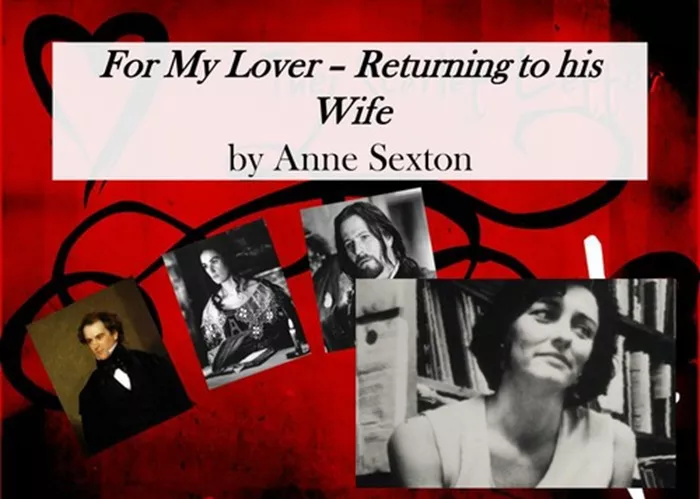Welcome to Poem of the Day – For My Lover, Returning to His Wife by Anne Sexton
Anne Sexton is one of the most powerful voices in American confessional poetry. Her work often explores themes like love, pain, loss, and identity. “For My Lover, Returning to His Wife” is a striking example of her honest and emotionally intense writing. In this poem, Sexton speaks directly to her lover, who is leaving her and going back to his wife. The speaker reflects on their affair and what it means now that it’s ending.
This article provides a clear, simple explanation of the poem. We will look at the speaker’s feelings, Sexton’s use of language, and the emotional power of the poem.
For My Lover, Returning to His Wife Explanation
The Situation: A Love Affair Ending
The title itself tells us what is happening. A man has been involved in an affair with the speaker. Now, he is going back to his wife. The speaker is not angry or begging him to stay. Instead, she reflects on the reality of their relationship and what it lacked. She accepts that he belongs with his wife, even though it hurts.
Sexton begins the poem with a tone of understanding. The speaker seems calm, almost resigned. She admits that the wife offers a kind of love and comfort that she cannot give. The wife is the “permanent” one, the one who can offer him peace, family, and structure. In contrast, the speaker sees herself as “temporary”—full of passion and chaos, but not stability.
Tone: Pain Wrapped in Acceptance
One of the most striking things about this poem is its emotional complexity. Sexton does not write with bitterness. Instead, the speaker almost praises the wife. She calls her a “woman with a mission.” She notes that the wife is graceful and stable. The speaker even calls herself a “carnival,” something fun and exciting but not lasting.
There is pain here, but it’s quiet. The speaker understands that she cannot compete with the depth and strength of a long-term marriage. She knows that passion fades, and comfort lasts.
This tone—both admiring and wounded—makes the poem powerful. The speaker is not weak, but she is honest. She sees the truth clearly, and she speaks it without shame.
The Language: Vivid and Honest
Sexton uses simple but striking images to show the difference between the speaker and the wife. She compares herself to a “carnival,” full of color and noise. The wife, on the other hand, is like “a house,” solid and dependable.
Here is an example from the poem:
“She is so naked and singular.
She is the sum of yourself and your dream.”
This line shows how deeply the speaker respects the wife. She sees her as the perfect match for the man—someone who fits him completely. The speaker realizes that their affair was only a part of his life, not the whole of it.
Sexton’s language is emotional, but also restrained. She does not use big, dramatic words. Instead, she speaks plainly, which makes the poem feel real.
Themes: Love, Loss, and Knowing Your Place
The central themes of this poem are love, loss, identity, and acceptance.
Love – The speaker clearly loved the man. But she also sees that his love for his wife is deeper and more lasting.
Loss – There is sadness in letting him go. Yet it is not a desperate kind of sadness. It is the sadness of someone who knows the truth and accepts it.
Identity – The speaker knows who she is. She is not pretending to be the wife. She knows her own wildness, her own role.
Acceptance – This is perhaps the most powerful theme. The speaker accepts her place in the man’s life, even if it means she must lose him.
The Ending: A Graceful Goodbye
At the end of the poem, the speaker offers a kind of blessing. She wishes him well as he returns to his wife. She does not fight to keep him. Instead, she honors what they had, and she lets it go.
This ending gives the poem a sense of peace. Even in sadness, there is beauty. Even in loss, there is love. Sexton’s speaker shows great strength by being honest and kind, even when her heart is breaking.
Conclusion
“For My Lover, Returning to His Wife” is a deeply human poem. It shows the quiet pain of losing someone you love—not to death, but to duty, to life, to marriage. Anne Sexton’s speaker does not cry out or blame anyone. She looks at the situation with clear eyes and speaks with grace.
The poem is about love, but it is also about knowing when to let go. It shows us the beauty in honesty and the strength in acceptance. Through plain language and powerful images, Sexton invites us into a private moment of sorrow, dignity, and understanding.
It’s a poem that lingers in the heart, long after the final line.

